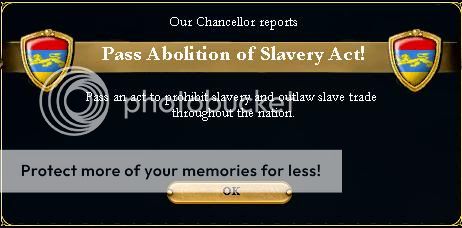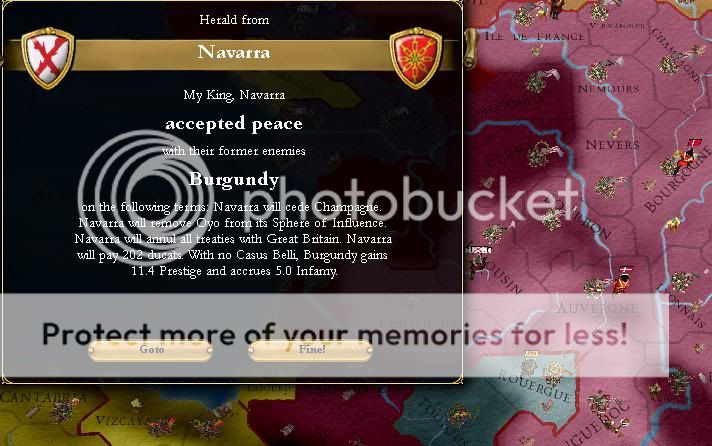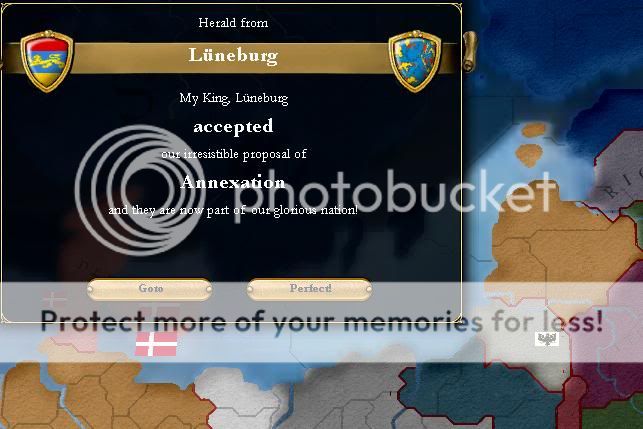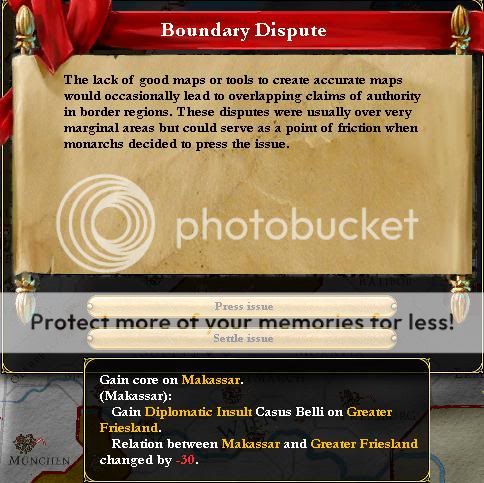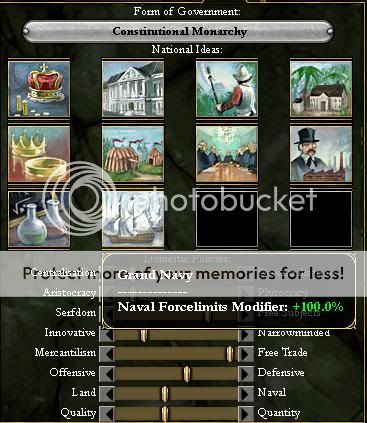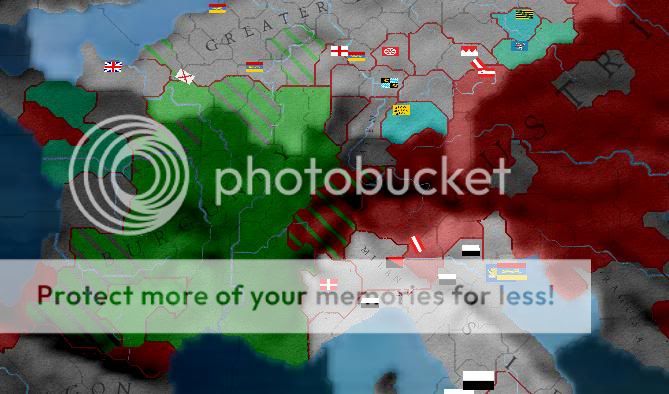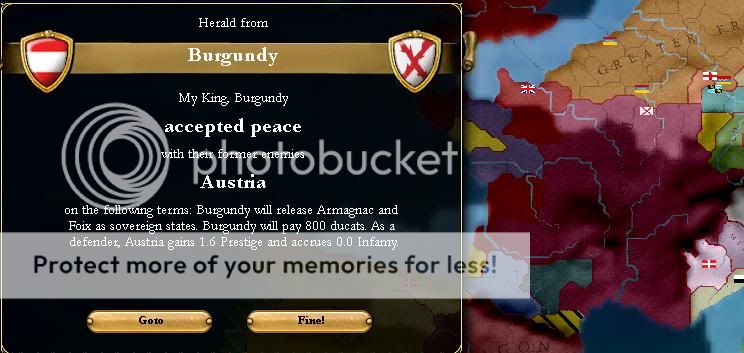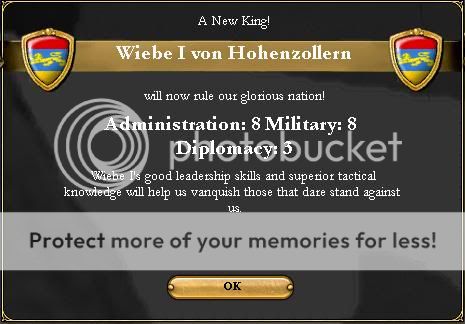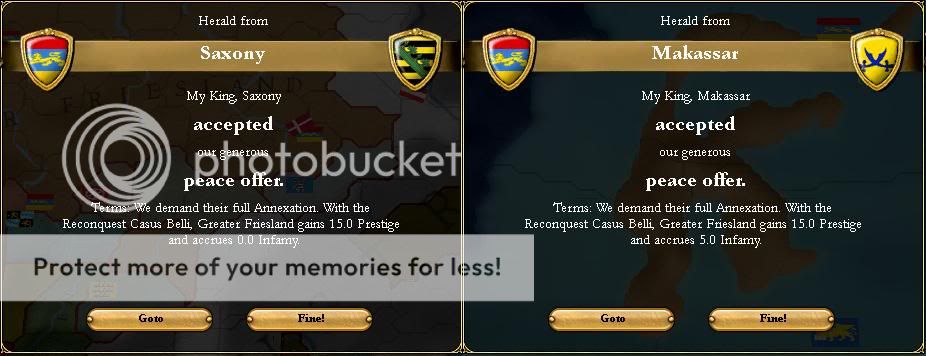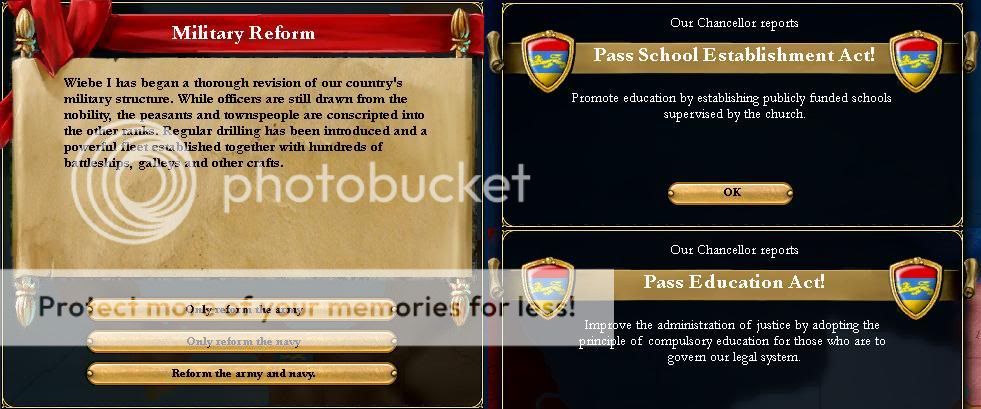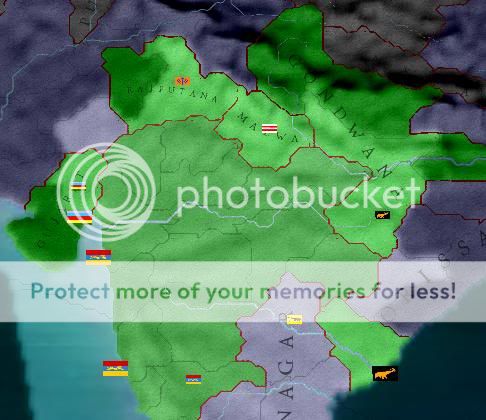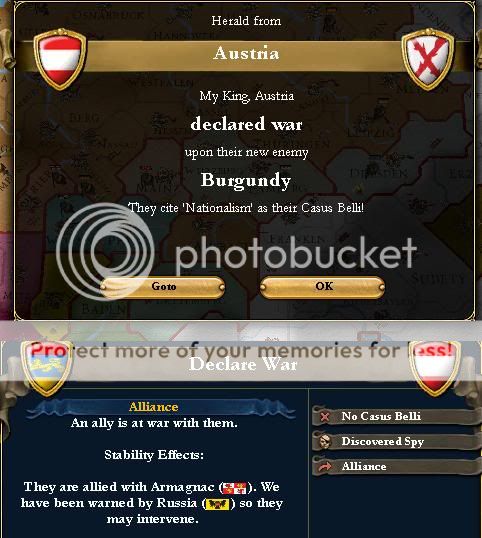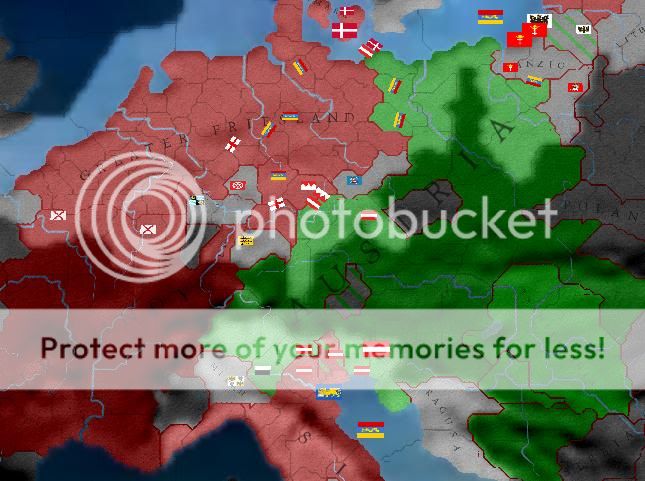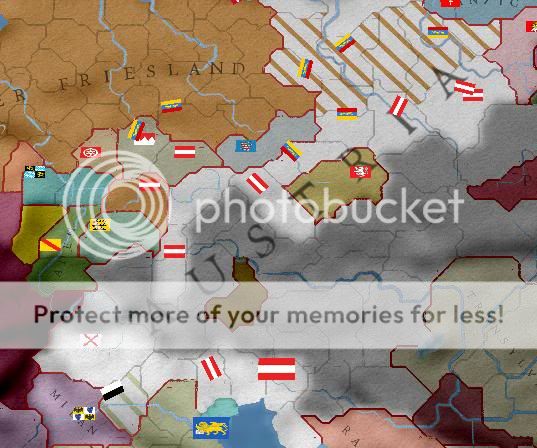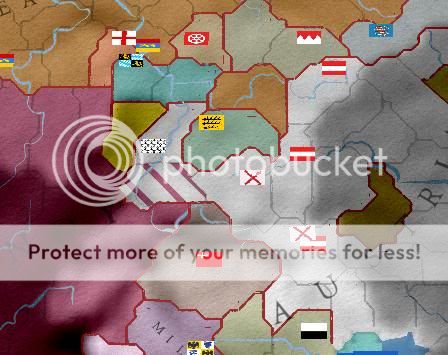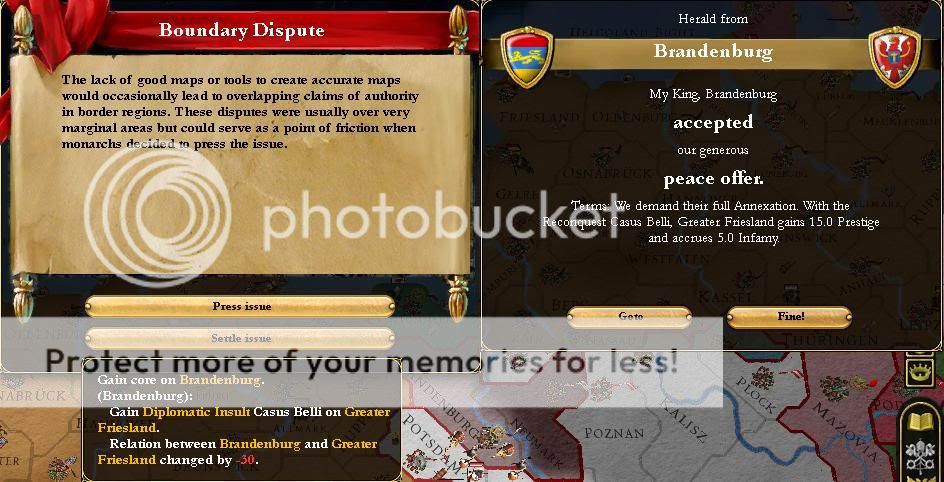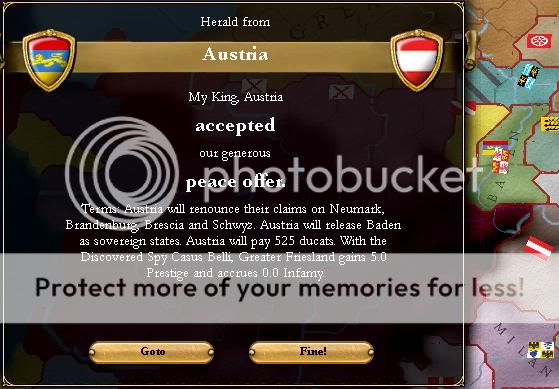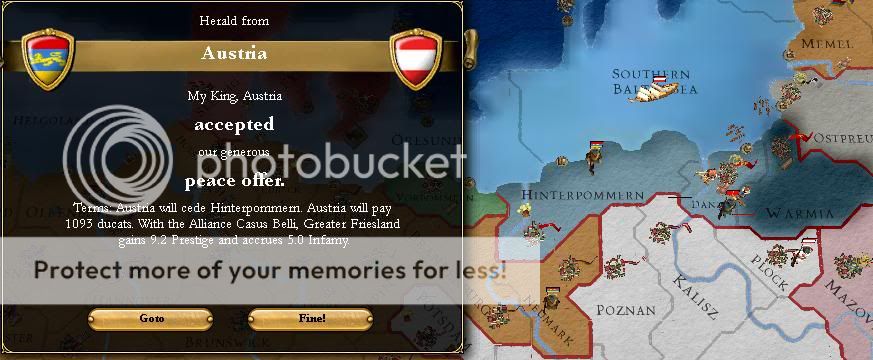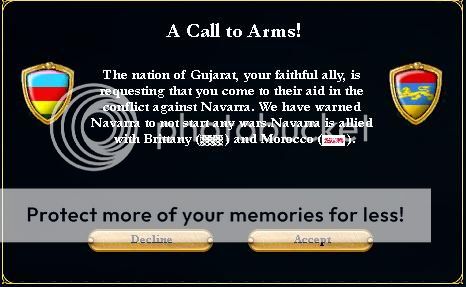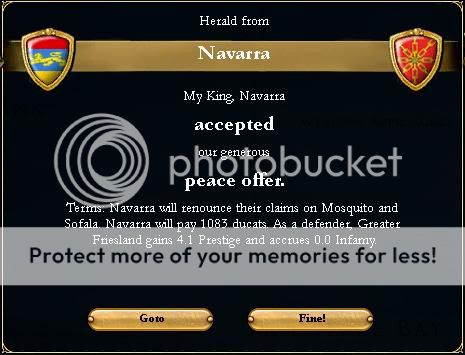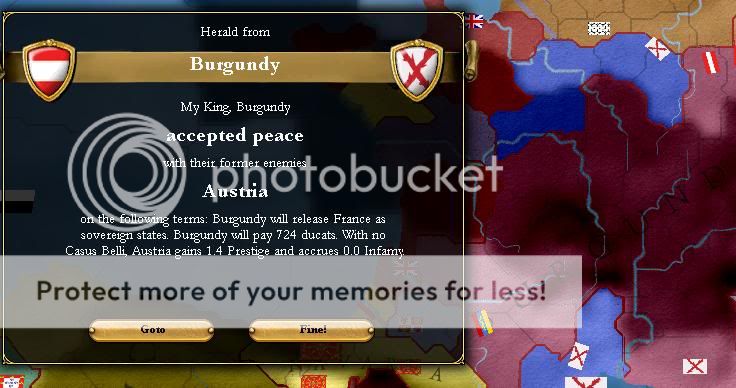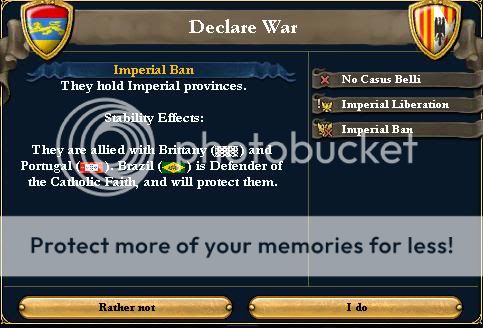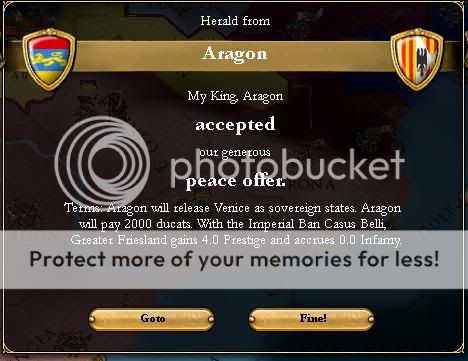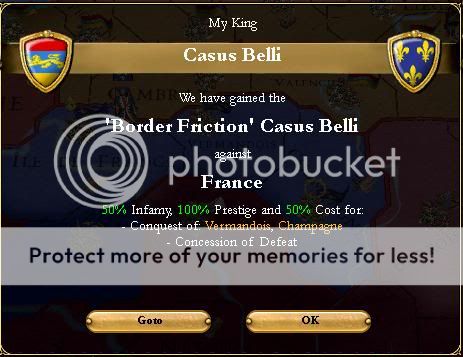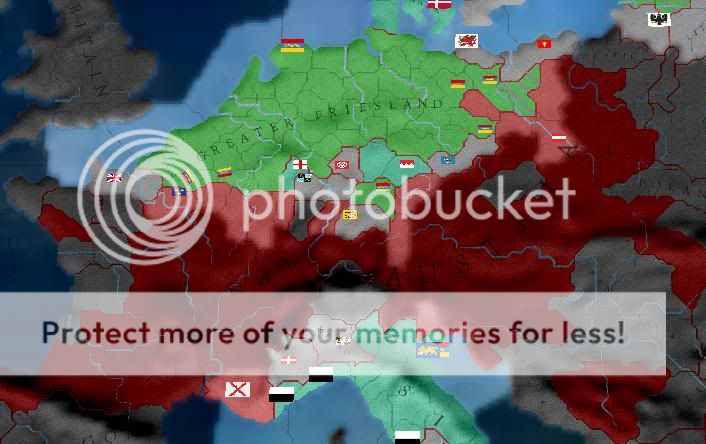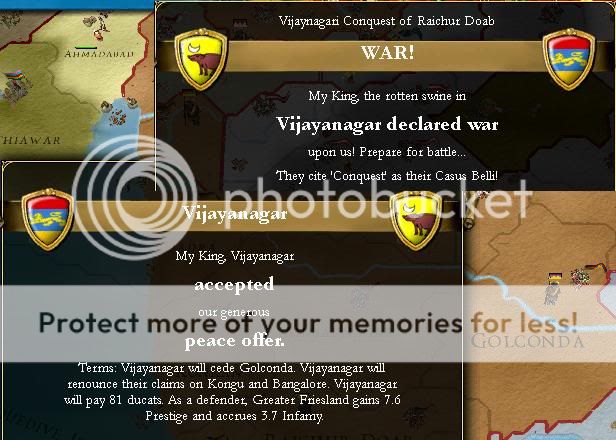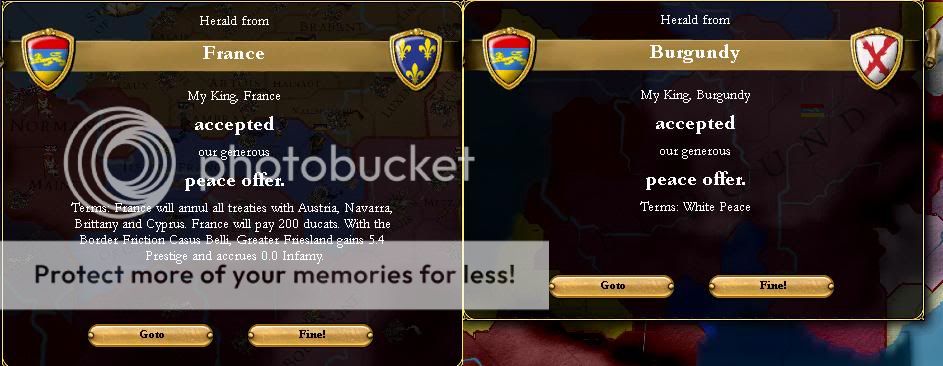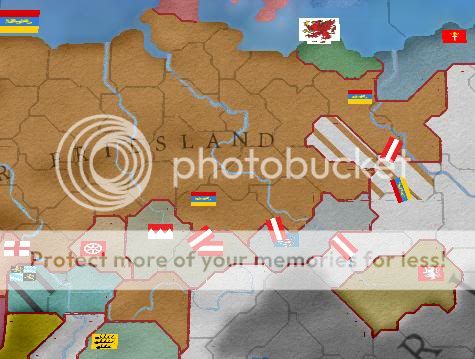History_Buff: Annoyingly most of the lands north of Bohemia already have their owners released, so I’d have to conquer it and then sell it on to whoever I want. That would be expensive in infamy. Or rather...it would be as things are right now...
Tjena Med Laxen: I wouldn’t underestimate Austria if I were you. The BWB has a surprise up its sleeve for us today.
 morningSIDEr:
morningSIDEr: Thanks!
Thanks for voting. A takes it, barely, but as it turns out I wasn’t quite able to get enough tech this update for the next NI slot.

o I’ll take it next time (unless a particular choice is made coming up...)
Chapter Forty Four: Ehre zu die Revolution!
The war with Navarra was a relatively minor affair, only involving some skirmishes in the colonies but there was one unexpected event that took place.
A successful invasion of the Frisian homeland for the first time in a long while occurred as Brittany moved its armies through Normandy to attack from the south. The nearest Frisian armies were already marching towards Navarra itself to force a peace deal, so the Bretons were left to rampage for a while.
Despite their allies efforts the Navarrans were unable to resist a direct attack on their homeland and soon a peace deal was secured.
Navarra would give up its claims on Frisian colonies and pay reparations, to Friesland of course, for the unprovoked attack on Gujarat.
The war between Austria and Burgundy came to a surprising conclusion, as Austria eked out its revenge for Burgundy’s earlier victory.
France was resurrected, although it had none of its former glory and was little more than an Austrian puppet that would almost certainly be reabsorbed by Burgundy as soon as the Austrian support was cut off.
In the confusion of the last few wars with Austria and Navarra, little attention had been paid to a minor Mediterranean conflict that saw Aragon attempting to reassert itself as a player in the region by conquering the Kingdom of Sicily. A side effect of this war was the invasion and annexation of the city of Venice despite them being allies that Aragon had no real claim to.
As Emperor, Wiebe I could not just sit by while this was happening and declared war on Aragon to liberate Venice once again.
Aragon itself was a pushover, with Frisians marching into Iberia and Sienese forces invading their Italian lands they weren’t really able to put up any kind of fight. Venice was once again given independence and monetary aid that was extracted from the Aragonese coffers.
Portugal, Aragon’s ally, was more of a problem due to the long border they shared with Friesland in North America. A number of skirmishes between Frisian and Portuguese forces and the Army of Texas marching directly towards their Mexican capital were enough to convince them to sign a ceasefire.
As the years ticked down on the ceasefire between Friesland and Austria, the Noble’s Council came to a realisation. They had no reason to go to war with Austria now that they had ceased their espionage activity and the Imperial bureaucrats were pacified over the annexation of Baden. IF they wanted to save Baden, they would have to find a way to get a casus belli. It took some years of waiting, but eventually it came.
The confidence of the French was boosted by their Austrian backers and so they were more than happy to provoke Frisian border guards without fear of retaliation. The conflict escalated to tensions along the whole border, which would be more than enough reason for Frisian forces to move in.
Austria wasn’t the only nation with interests in protecting France however. Burgundy was in no mood to hand over more French-speaking lands to the Frisians and were willing to join Austria to do so.
With Friesland and Siena on one side and Austria and Burgundy on the other, the Empire was divided in half completely as it had been in centuries past. It was a sign of the times that it was not along religious lines as it had once been, but geopolitical lines as alliances were made in spite of conflicts of faith.
The natives of India took this as a chance to reclaim some of their lands.
As usual, they didn’t realise the fact that Frisian colonial armies were operated separately from those in the homeland so they remained at full strength. Further territorial concessions were secured in short order.
The new Frisian doctrine was plainly simple. The bulk of the enemy army was to be engaged and destroyed before a full invasion of their territory could take place. However, Burgundy’s focus was in the south against Siena so that couldn’t really apply to the western front. Frisian forces effectively ploughed straight through France and marched on Dijon.
After Friesland made peace with France without taking any territory, and in fact making them annul the ties with Austria that kept them safe, Burgundy was more than willing to sign a ceasefire as the main reason for them joining the war had turned out to not matter.
The diversion of forces to deal with France and Burgundy had put a major crimp in plans to engage and destroy the Austrian armies advancing on Friesland. To smoothen things out, Frisian forces withdrew to behind the lands of Wurzburg and seized parts of North Austria to give a more continuous frontline.
Without having to worry about being outflanked the Frisians began to engage the main Austrian forces wherever they could. Initial battles turned out surprisingly poorly, as large numbers of Austrian cavalry lead by skilled cavalry commanders were able to tear apart Frisian battle lines with shocking ease. It cost them significantly in casualties to do so though, and it quickly became clear that Friesland as Holy Roman Emperor could outlast the Austrians.
The main Austrian force invading Wurzburg retreated shortly after beating off a Frisian attack but taking heavy losses in the process. This was the perfect chance, and reserves moved up from inside Friesland to pursue the enemy into the heart of their territory. Doctrine or not, this chance could not be missed.
The Austrian army was destroyed, leaving the only major concentration of Austrian forces all the way north in Poland trying to catch the much more swiftly moving, due to it lacking cannon, Army of Oldenburg.
That victory was the end of all Austrian resistance south of Bohemia. With nothing to stop them, Frisian forces freely roamed the Austrian heartland conquering whatever they pleased whenever they pleased.
Vienna fell before the Austrian army in Poland had any chance to react and in an effort to save their own skins the Regency Council in charge their agreed to a humiliating peace treaty.
Baden was freed yet again, as was Hungary. Worst of all for the Austrians, the city of Potsdam was annexed into Greater Friesland. This had been the jewel of their northern territory, a grand design to see Austrian culture spread into the lands of northern Germany. Now it was nothing more than another piece of land lost to their arch-rival.
There was one man in particular who felt that the leaders of the country had gone too far this time. Giving up the last bit of dignity his country had in the whole North Austria debacle was the straw that broke the camel’s back and caused him to rise up in open revolt.
Rainer Hagedorn from Styria was a commander in the Austrian army with a whole legion of loyal soldiers at his back. He marched from his homeland towards Vienna with the intent of annihilating the council of nobility that was sitting in place of the young Princess Maria. However, before he could complete his quest he was met by a large force of loyalist Austrians, defeated in battle, and captured. With revolutionist sentiment spreading through the country, the council decided to throw him in the deepest dungeon of the capital and throw away the key rather than executing and making a martyr of him.
That did nothing to stop what was coming, for the revolutionaries were receiving funding from an unlikely source. The Common’s Council of Greater Friesland was eager to see Austria weakened by civil war, and was also interested in seeing if it was possible for such an entrenched monarchy as Austria’s to be replaced by a stable republican system. Without permission from the higher authorities they were covertly shifting funds from the military into Austria. With the wealth of Friesland at their backs the revolutionaries got bolder despite the confinement of their leader.
The constant upsurge of feelings from their population panicked the council, causing them to bypass all the laws they could to put Maria on the throne as quickly as possible to try and placate the rebels.
Of course, putting a teenage girl in charge of one of the greatest crises her country had faced was not exactly the best way to solve the problems. Queen Maria I had been raised from a very young age to deal with diplomatic and military matters, especially those relating the Friesland, and she was not nearly as skilled in dealing with the running of a country.
More than that, Maria was the latest in a long line of sovereigns descended directly from Koenraad the Reformer of Friesland. While this had not been a big issue in the past, as the Frisian branch of the Hesse-Kassels had died out long ago, in the upsurge of public anger there were open questions about whether the Queen and her regency council were actually secretly Frisian supporters.
The chaos in Austria continued for two years before it came to an inevitably bloody conclusion. A massive army of civilians stormed into Vienna and tore down the gates of the central prison, freeing Rainer Hagedorn from captivity. With this ragtag army at his back, Hagedorn marched on the royal palace and demanded to see the Queen.
Maria, being the naive young girl that she was, met with Hagedorn face to face to try and settle things. Naturally as soon as she made her appearance the revolutionaries moved in and arrested her. After a brief show trial she was executed along with the council of nobles that had raised her. With her death, the revolutionary army declared its victory and that from then on their nation would be the Free Republic of Austria.
The abrupt end of one of Europe’s oldest monarchies sent shockwaves throughout the continent. Wiebe I called an emergency meeting of the leaders of the Noble’s and Common’s Councils to discuss the situation, but his cabinet made no appearance at all. In a message to the meeting they made their position clear at last. For too long Greater Friesland had been dominated by the aristocracy and now it was time for the common people to rise up and take the nation for themselves, as the Austrians had done. Such an idea was abhorrent to Wiebe, and he declared he would stop at nothing until the revolutionary movement was crushed both at home and abroad. The Noble’s Council was not willing to dive into civil war so quickly and suggested taking things more slowly and seeing how the Austrian situation panned out before making such rash statements. Whoever came out on top in this struggle could determine the fate of all of Europe.
To be continued...
The fate of Friesland ultimately rests with the commander of the military. Whoever he backs will have the upper hand in any resulting conflict. Who does he side with?
Option A: The King: Massive revolutionary rebel uprising, take Revolution/Counter-Revolution idea (I didn’t quite get enough tech for the penultimate slot this update, so Espirit D’corps will wait for the final slot if this is chosen), stop at nothing to restore monarchy to Austria.
Option B: The Noble’s Council: Medium-sized revolutionary rebel uprising, only fight defensively against Austria, no other real effects. Safe but boring choice.
Option C: The Common’s Council: Massive loyalist rebel uprising, switch to Revolutionary Republic, ally with Austria against other monarchies.
Edit- I should probably add a bit of clarification to things. If A or C is picked then approximately half of European Greater Friesland will come under rebel control and I'll have to fight to secure that choice. If the headquarters of the loyalists/revolutionaries is occupied by the opposite then that side wins even if even you voted for the opposite (of course, since I'll be controlling the one you vote for then that isn't likely). Also I should mention that taking option C will effectively be the end of the Holy Roman Empire as its two largest powers will have abandoned it.
I have my last exams on Thursday, so I'll do all the event coding on Friday and I should have the next update up on Saturday.
World Update 1796:
Wierdness: Castille is in China and
Bali of all countries has managed to conquer parts of New Guinea.


